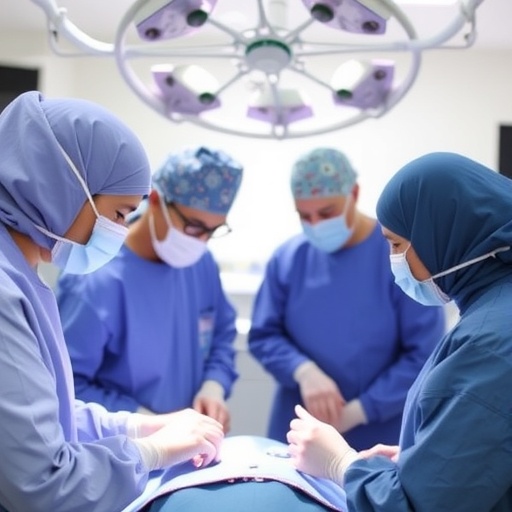In a groundbreaking study, researchers have delved into the intricate link between spiritual health and professionalism among operating room interns in Iran, casting new light on an often-overlooked aspect of medical training. This investigation aims to understand how spirituality can bolster professional behaviors, effectively shaping the future landscape of healthcare in the region. The findings, which will be published in “Discover Mental Health,” provide valuable insights that both medical professionals and educators may find particularly pertinent.
Operating room interns grapple with high-stress environments that demand exceptional professionalism. However, the factors contributing to their ability to maintain this professionalism have not been thoroughly explored until now. The significance of spiritual health in fostering emotional resilience, ethical decision-making, and compassionate patient care has emerged as a focal point of this research, highlighting its potential to positively influence the healthcare environment.
The study utilized a mixed-methods approach, combining quantitative surveys with qualitative interviews to gather comprehensive data on the spiritual health of a sample group comprised of operating room interns. Participants reported their personal definitions of spirituality, alongside how these beliefs intersected with their professional roles. This multifaceted data collection revealed nuanced perspectives on how spiritual practices can directly inform a medical professional’s ability to excel in their work.
During the quantitative phase, researchers measured various dimensions of spiritual health, including personal belief systems, connection to a higher purpose, and the sense of belonging within a healthcare setting. Interns who reported higher levels of spiritual well-being demonstrated not only greater job satisfaction but also superior communication skills with patients and staff. This correlation suggests that spiritual health could serve as a buffer against the emotional toll often associated with high-stress medical environments.
Qualitative findings further underscored the role of spirituality in shaping professionalism. Many interns articulated how their spiritual beliefs guided their interactions with patients, helping them cultivate empathy and understanding. This intrinsic motivation to connect with others on a deeper level may very well enhance patient care, benefiting not just the interns, but the larger healthcare community. Transforming this abstract concept of spirituality into practical applications could herald a new era in medical training.
Moreover, the researchers identified that spirituality could serve as a mechanism for coping with the rigors of medical training. Among the interns interviewed, practices such as meditation, prayer, or reflection provided critical emotional resources that supported mental health and well-being. The ability to pause and engage in self-reflection allowed these interns to process their experiences, mitigating burnout and promoting a healthy work-life balance.
The concept of professionalism in medicine is evolving, becoming increasingly interwoven with holistic approaches to caregiver and patient relationships. By integrating spiritual health into the curriculum, medical schools may unlock new potential in their students. However, this integration raises questions: how can educational institutions best incorporate these elements without infringing upon personal beliefs? The answer to this dilemma lies in fostering a respectful environment that acknowledges diverse spiritual perspectives while emphasizing shared values of empathy and professionalism.
Another layer to this discussion is the potential for spiritual dialogue within training programs. Facilitating respectful conversations about spirituality may enrich interns’ abilities to connect with their peers and patients alike. As medical environments become more diverse, recognizing and embracing various spiritual backgrounds can offer a broader understanding of patient needs, ultimately enhancing care quality.
Healthcare systems worldwide are confronting unprecedented challenges, particularly in enhancing staff well-being and retention. This study contributes a promising perspective on how addressing spiritual health can augment professional efficacy, suggesting that a well-rounded approach to medical education could be an antidote to mounting stressors in clinical settings. The implications are far-reaching, inviting a reevaluation of how future generations of medical professionals are trained.
The alignment of spiritual health with professionalism not only benefits medical interns but has the potential to redefine patient interactions across diverse healthcare contexts. When physicians approach their roles with a strong sense of spirituality, their practice transcends mere clinical tasks and becomes a profound vocation. Medical professionals attuned to their inner values may find greater purpose in their work, improving outcomes not only for themselves but also for their patients.
In conclusion, the research by Imani and colleagues shines a light on the profound connection between spiritual health and professionalism among operating room interns in Iran. This multifaceted approach provides vital insights into how spirituality can enrich medical practice and shape compassionate practitioners. As healthcare continues to evolve, embracing the multifarious dimensions of human experience, including spirituality, may well become essential to cultivating comprehensive, effective, and humane healthcare.
In this context, experiences of spirituality should not simply be left to individual encounters but ought to be systematically integrated into medical training programs to enhance overall professional development. As this discourse continues, it may influence how healthcare professionals view their roles, aligning them with broader human values that connect caregivers and patients alike.
The results of this study appear poised to spark further research and exploration within the fields of medical education and mental health, offering a roadmap for integrating these critical elements into healthcare practice. As such, those invested in the future of medical training should pay close attention to the growing body of evidence supporting the transformative power of spiritual health in fostering professionalism among medical interns.
Subject of Research: The relationship between spiritual health and professionalism in operating room interns.
Article Title: Exploring the relationship between spiritual health and professionalism in Iranian operating room interns.
Article References:
Imani, B., Khahan-Yazdi, I. & Najafi-Vosough, R. Exploring the relationship between spiritual health and professionalism in Iranian operating room interns. Discov Ment Health 5, 122 (2025). https://doi.org/10.1007/s44192-025-00244-z
Image Credits: AI Generated
DOI:
Keywords: Spiritual health, professionalism, medical education, operating room interns, Iran.




